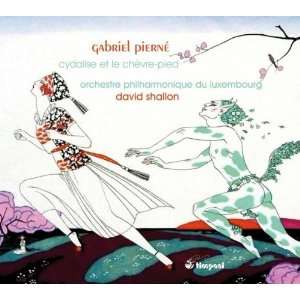|
Back
08/10/2012
Gabriel Pierné: Cydalise et le chèvre-pied
Collège vocal de la cathédrale de Metz, Christophe Bergossi (Chorus Master), Orchestre Philharmonique du Luxembourg, David Shallon (Conductor)
Recording: Luxembourg Conservatory (May-June 2000) – 73’ 39
Timpani #1C1174 – Booklet in French and English

   
The name Gabriel Pierné gets overlooked if one reaches into the archives of the turn-of-the-century classical music composers. Pausing to step back in time we find a prodigious man who absorbed novelties in his compositions that transcribed into what we now know as modern ballet. Born in Metz, France, Pierné was a precocious youngster, garnering almost every conceivable award in the world of classical music: at only eight years of age, he was accepted into the Paris Conservatoire and by the time he was awarded the Prix de Rome in 1882, he had achieved first place successes in the categories of piano, counterpoint, solfège, organ and fugue.
Doors of Romanticism were opening up into an innovative salon of Impressionism. Gabriel Pierné assuredly stepped back and forth between these two rooms and also delved back into the Baroque chamber. Pierné’s respectful homage included these approaches in his own works. Jules Massenet and César Franck provided additional inspiration for Pierné to chart his own path into uncharted territories with a salient signature. Close associate to Ballets Russes’ founder, Sergei Diaghilev, Pierné actually premiered two works: Stravinsky’s The Firebird (1910) and Ravel’s Daphnis et Chloé (1912). The awakening of these two highly stylized compositions helped strengthen his uniquely colorful Cydalise et le chèvre-pied. Completed in 1914, the public remained unexposed to its existence until the opening on January 15, 1923.
Cydalise et le chèvre-pied has a luminescence and compounded imagination beyond words. The Armand de Caillavet/Robert de Flers libretto is brilliantly scored through music using selected, emphasized instruments and distinct percussion. The plot centers around two forces, mortal and mythological, commingling in a moment’s breath, yet relinquishing within a flash. Pierené’s music dovetails alongside recognizable operas, symphonic poems and patterned rhythms of the times.
The opening “Introduction” strikes resemblances to Debussy’s “Sirènes” from Nocturnes and repeats itself throughout and during the final moments. The following “Dance of the Dryads and the Hamadryads” conjures parallels to Prélude à l'après-midi d'un faune, emphasizing grand extensions and increasing spiritual intensity. Never forgetting his roots, Pierné paid reverence to the Baroque Era by adding beautifully apportioned harpsichord in Act II; he also magnified the woodwinds by beefing up flutes and piccolos.
As the curtain rises on Act II, we find preparations underway for a “ballet within the ballet”, La Sultane des Indes. Fussing abounds ahead of Cydalise’s arrival. Action-wise, these anticipations resemble those to Philine’s arrival in Thomas’ Mignon. The comédie-ballet itself is very short, but it helps move along the growing ardent connection between Cydalise and Styrax. Brass horns circle us back to Pelléas et Mélisande while the brief runs on the xylophone supplement humoristic qualities bearing images of Shostakovich’s The Bright Stream; oboe solos stimulate with whimsy. Pierné takes full advantage of his orchestral sources as he prevails upon specific instruments to clarify the picture and enlarge emotions. Cydalise has unquenchable pizzazz and textural shimmers of medieval overtones, and there is an uncanny sharpness and focus in his music.
Founder of the Timpani Label, Stéphane Topakian’s corporate mission is to corral music from the French repertoire spanning late 19th century to present times. Timpani’s Cydalise et le chèvre-pied was awarded Record of the Year at the 2002 Midem (Marché International du Disque et de l'Edition Musicale) Awards in Cannes, France. The Orchestre Philharmonique du Luxembourg, under the direction of the late David Shallon, delivers a highly articulated formulation. The sound mix is superb, but the only concern going for the album is in the English translation: misspelled words, wrong punctuation and grammatical errors.
Anyone desiring to reach beyond the traditional repertoire will want to grab hold of this CD. It is magnificent and unlike any other.
Christie Grimstad
|